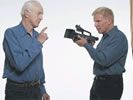Eye For Film >> Movies >> Tell Them Who You Are (2004) Film Review
Haskell Wexler is undoubtedly one of the finest and most prolific cinematographers in the history of the silver screen. He has trained his lens on films such as One Flew Over The Cuckoo's Nest (1975), Who’s Afraid Of Virginia Woolf (1966), In The Heat Of The Night (1967) and Coming Home (1978) and earned two Oscars in the process. Judged by the International Cinematographers Guild to be one of the ten most influential cinematographers of our time, he has had an eclectic and somewhat auteristic career. In addition to having worked with some of the greatest directors of the 20th century, he has also dabbled in comedy working with Michael Moore on the brilliant Canadian Bacon (1995) and music videos with the inimitable Bruce Springsteen.
A career spanning nearly 60 years affords his son, the man behind this documentary, Mark Wexler, an almost peerless list of interviewees including Hollywood luminaries such as Michael Douglas, Jane Fonda, Sidney Poitier and Paul Newman. Amid the gleaming mass of stars, however, lies a humorous, touching and poignant portrayal of a father and son seeking to reconcile their differences through the one passion they both share.

While Haskell is unflinchingly revealed to be a deeply intriguing if somewhat crabby character, Mark’s love and admiration for his father is palpable throughout. The footage is shot with real honesty and the bond of mutual love and volatility between the two is approached openly, in a manner which lends each scene a uniquely personal tone. The tumult of emotions that resonate throughout Mark’s candid inquisition of his father leaves the viewer feeling like a voyeur peeping through a hole into the house next door.
To give some explanation of the conflict that occurs between Mark and his father it seems fitting to put their difficult relationship into a context of film. Two of Haskell’s most notable directorial offerings Medium Cool (1969) and Introduction To The Enemy (1974) are a good reflection of his fiercely left-wing political proclivities. Medium Cool gives a fictional account of the violence that took place following the 1968 Democratic Convention, whereas Introduction To The Enemy was an anti-war documentary shot in Vietnam starring Tom Hayden and Jane Fonda. Much to Haskell’s chagrin, Mark seems to have completely abandoned his father’s anti-establishment principles and proudly displays shots of himself with Presidents Clinton, Bush, Carter and Ford taken during his 2001 documentary on the role of Air Force One.
Interestingly, such political clashes were not limited to his family as, working with Elia Kazan on his first big-budget film, the cinematographer famously clashed with the right-wing director. This left an indelible grudge with Kazan, who famously said of Wexler: “I would never work with him again but he’s a damn good cameraman.”
An example of how deep seated this political quarrel has become can be seen when Mark is taken to an anti-war demonstration in San Francisco with his father. It becomes clear that Haskell views his son’s fervent acceptance of the establishment as something of a keen betrayal of his own zealous ideals. This is symbolic of the many occasions where the two clash throughout the documentary, butting heads over the most innocuous of details. Mark’s avid desire for his father’s approval is perhaps one of the reasons the film came to be and, as they film each other, it becomes clear that unresolved differences are a sore point for both men.
As a documentary subject, Haskell is undoubtedly one of the most challenging his son will face in his career. Having reached the age of 80, the cinematographer seems to have retained a youthful verve that is set aside for his profane outbursts at what he perceives as his son’s novice mistakes behind the camera. One of the clear signs of Haskell’s shamefully self-proclaimed genius is that he professes to never working on a film where he didn’t think he could do a better job than the director. This is a fairly weighty claim considering Haskell has worked with the likes of George Lucas, Francis Ford Coppola and Milos Forman.
In short, Tell Them Who You Are is a truly rare opportunity to take a very personal journey into the life of one of Hollywood’s greats. The temperamental genius that has seen him clash with so many of his peers is revealed in no short measure but the sense of affection overrides any bitter taste left by his spats with his son. As Haskell visits his ex-wife (Mark’s mother) in the centre where she is being treated for Alzheimer’s, the raw spectacle of emotion is overwhelming. The pain of knowing she no longer remembers their love is inexorable and Haskell makes no attempt to hide his feelings as he talks of the secrets they once shared.
As Haskell and his son leave the hospital, in a typically defiant mood, he turns to Mark and says: “I knew your camera was there but I didn’t give a ****”. This, if anything, typifies the tender honesty of the film. It shows us a man who is revered by so many for his genius and, more importantly, a man cherished by his son, in spite of their differences, for no other reason than love.
Reviewed on: 08 Apr 2007

















